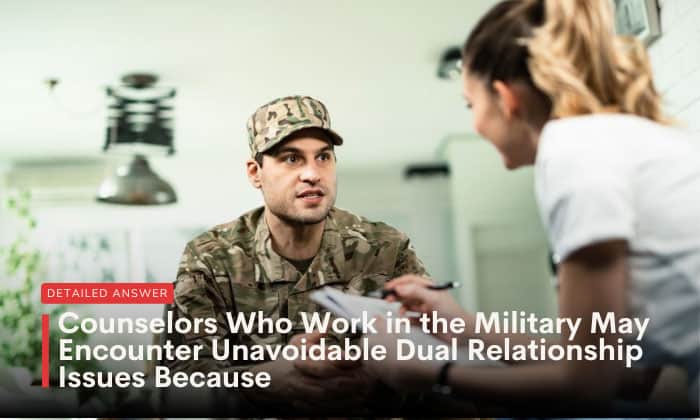Military counselors are significant mental healthcare personnel who help active-duty people and veterans overcome various cognitive difficulties in life. Counselors who work in the military may encounter unavoidable dual relationship issues because of their multiple roles of a counselor and a commissioned military officer.
Let us walk you through the conflicts of unavoidable dual relationships between the military and their counselors in this article.
Table of Contents
The Complication in Dual Relationship of Military Counselors
Because counselors may also be commissioned military officers, they might have a dual (superior-subordinate) relationship with their clients. In other words, in addition to being the client’s counselor, they may also be their superior or subordinate.
Frequently Asked Questions
Ethical Concerns With Dual Relationships In The Military Setting?
In most cases, military counselors find themselves bearing the potential to compromise their professional principles. Although it is common to have confidentiality issues, the dual relationship between counselors and clients is also a significant concern.
The nature of dual relationships may be wholesome from a clinical standpoint. For instance, the client and their therapist are colleagues — mutual trust is already there. However, a lot can still go wrong when boundaries get compromised.
1. Lack of objectivity
Sometimes, a military counselor may treat a client who is a well-known social media personality. Counselors may view a client’s social media profile, but it is unethical to follow them. This is because their admiration may skew their clinical assessment.
It would be beneficial for both players to avoid getting connected online or any digital connection. This includes social media affiliations on Twitter, Facebook, LinkedIn, and the like.
2. Unclear boundaries
Friendships with former clients are not a new topic. In any relationship, may it be platonic or romantic, a definition of a “boundary” must be settled first between the parties involved.
It is somehow unavoidable to get carried away in sessions. Counselors who hug their clients must not occur in a healthy client and therapist relationship. In addition, these boundaries serve to protect the welfare of clients.
3. Sexual dual relationship
The APA Code of Ethics forbids therapists from being sexually intimate with their clients as it will result in moral conflicts of interest. Also, counselors should not take on anyone with whom they have been intimate in the past.
Counselors who have sex with their clients can face severe legal consequences. Although therapists can pursue a romantic association with a former client, supposing at least two years after the therapy ended, it is still highly discouraged.
4. Institutional dual relationship
Therapists must serve a particular institution, such as hospitals, prisons, or military bases. Military counselors must only engage with their clients as is — a prisoner’s therapist and a parole evaluator.
5. No guidelines regarding the end of therapy
A client having a dual relationship with their counselor may be reluctant to terminate the session for fear of awkward encounters in the outside world. This results in therapy taking longer than necessary.
Why should dual relationships be avoided?
Dual relationships contribute to a conflict of interest between clients and psychology professionals. Mixing unprofessional encounters with clients somehow results in poor judgment and flawed diagnoses.
What are dual relationships in counseling?
Dual or multiple relationships refer to a circumstance in which various roles exist between a client and a therapist. For instance, dual relationships can occur when a client is a family member, a former lover, or a friend.
Why are dual relationships considered harmful?
Having a dual relationship with a client enhances the potential for abuse of power and exploitation. In addition, this may result in counselors and clients having diverse expectations of therapy.
Conclusion
Each social work environment poses unique challenges, and military counselors are no exception. Counselors who work in the military may encounter unavoidable dual relationship issues because of boundaries, confidentiality, and privacy concerns.
Fortunately, the ACA Code of Ethics offers guidelines regarding dual relationships between counselors and clients. It includes more explicit policies between ethically acceptable and strictly prohibited dual relationship encounters.

I am Everett Bledsoe, taking on the responsibility of content producer for The Soldiers Project. My purpose in this project is to give honest reviews on the gear utilized and tested over time. Of course, you cannot go wrong when checking out our package of information and guide, too, as they come from reliable sources and years of experience.





